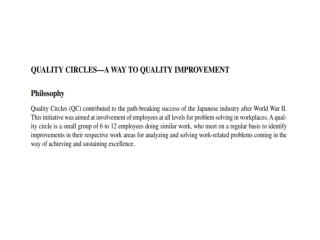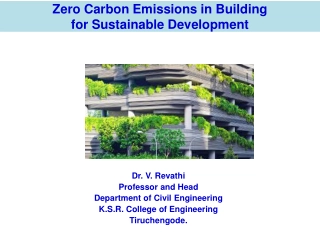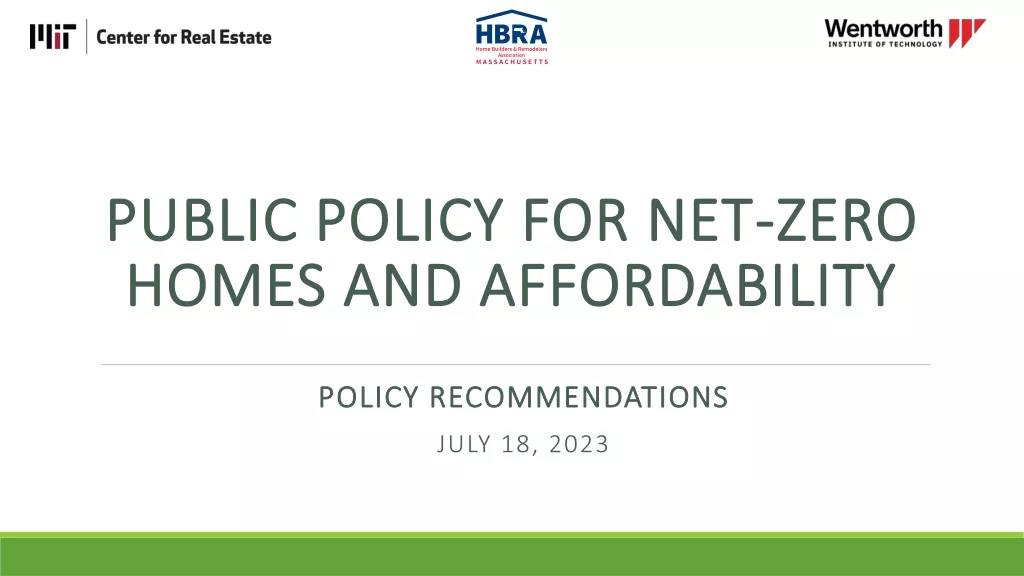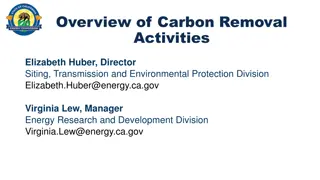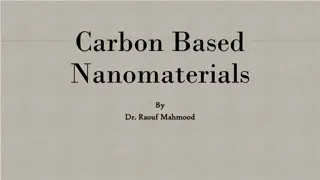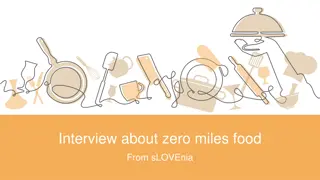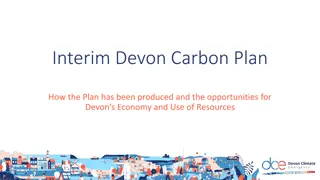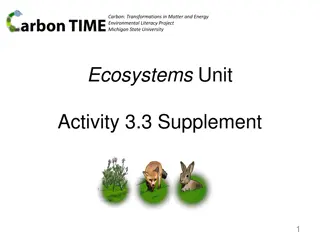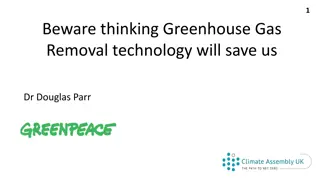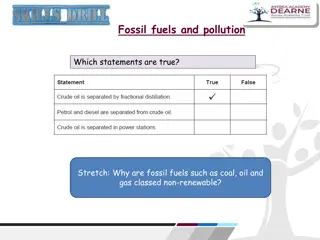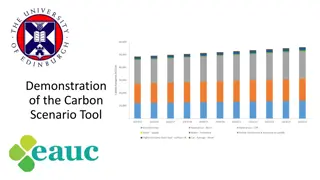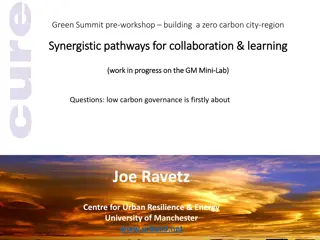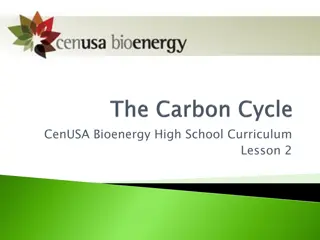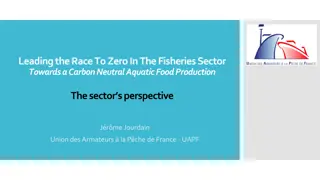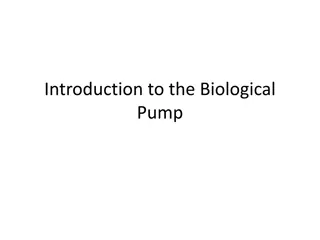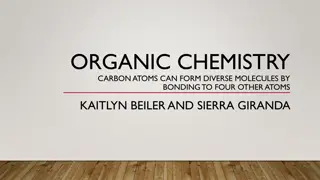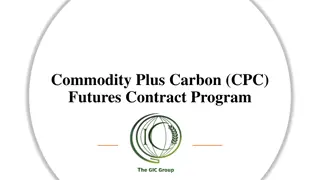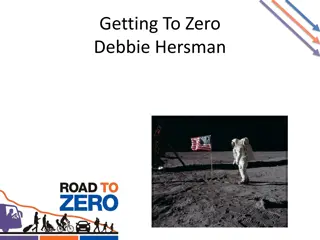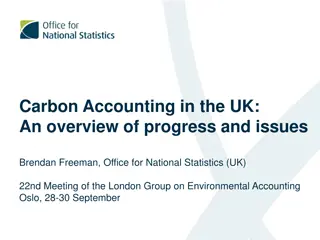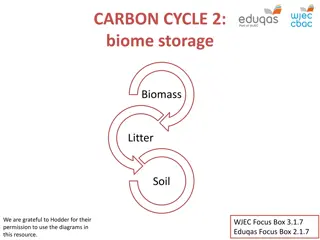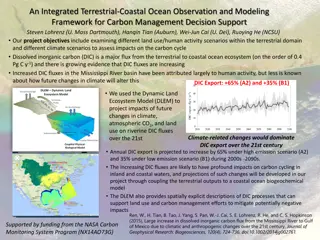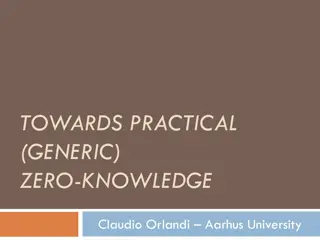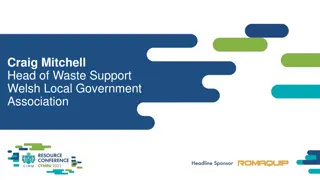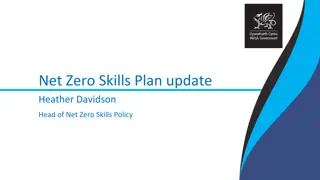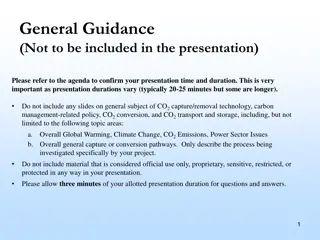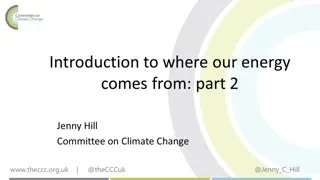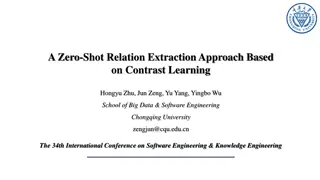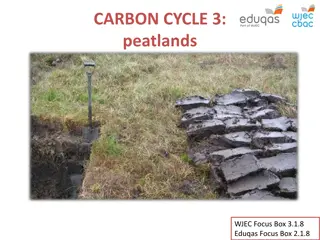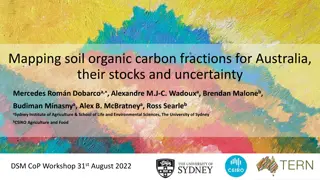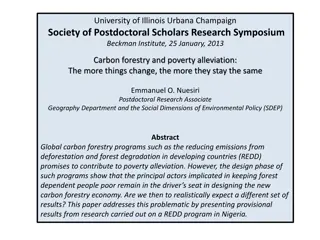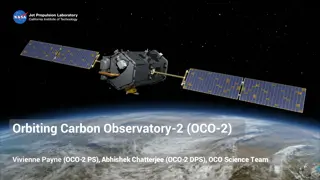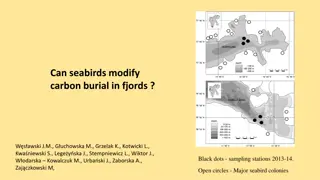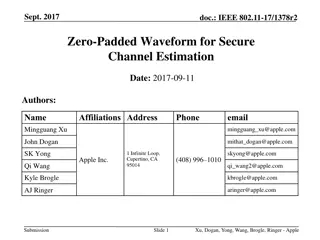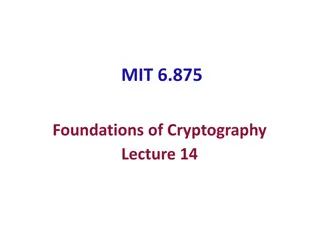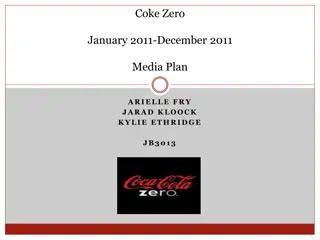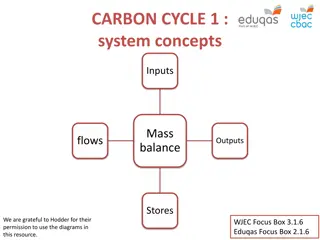Zero Defects Philosophy in Quality Management
Zero Defects Philosophy is a key principle in Total Quality Management, advocating for perfection in products and processes by eliminating defects completely. Philip Crosby popularized this concept, emphasizing that defects are never acceptable. Key concepts include "Quality is Free" and "Do It Righ
0 views • 19 slides
Understanding Sustainable Development and Zero Carbon Emissions in Buildings
Sustainable development aims to meet present needs without compromising future generations. Zero carbon emissions in buildings play a crucial role in combating climate change. This article explores the pillars of sustainability, greenhouse gases, global emissions, and steps towards achieving net zer
1 views • 56 slides
Harnessing Carbon Markets for Sustainable Development in Pakistan
Understanding the significance of carbon markets, this content delves into the interplay between economic growth and environmental sustainability, emphasizing the urgency to limit unsustainable practices. It explores mechanisms such as carbon pricing and cap-and-trade systems in the context of clima
0 views • 17 slides
Carbon Pricing Overview and EU Green Deal Agenda
The overview of carbon pricing inside the EU highlights key aspects such as the EU Green Deal, revision of the EU ETS, and the Carbon Border Adjustment Mechanism. The EU aims for carbon neutrality by 2050 with a 55% reduction target. The Fit for 55 initiative emphasizes relevance for the Energy Comm
4 views • 16 slides
Strategies for Advancing Net Zero Homes and Affordability in Massachusetts
Urgent action is required in Massachusetts to reduce carbon emissions from residential buildings and address housing affordability. The intersection of net zero goals and affordability is crucial, requiring policy recommendations and affordability analyses to guide the transition. Research questions
0 views • 31 slides
The Road to Net Zero: Importance of Data Collection in Energy Management and Consulting
Cotopaxi, a leading energy consultancy, highlights the significance of data collection in achieving net-zero emissions. Mark Jones, a senior energy engineer, emphasizes the long-term impact of climate change and the necessity for businesses to adapt. The journey to net-zero involves measuring, monit
1 views • 15 slides
Overview of California's Carbon Removal Initiatives
California's Carbon Removal Innovation Support Program (CRISP) aims to incentivize Direct Air Capture (DAC) development in the state. The program includes research test centers, small-scale demonstrations of DAC technologies, community engagement, technical assistance, and more to enhance carbon rem
0 views • 5 slides
Understanding the Carbon Cycle: Reservoirs, Dynamics, and Importance
Earth's carbon cycle plays a crucial role in sustaining life, with carbon moving through various reservoirs and processes. This cycle involves short-term terrestrial and marine cycles, as well as long-term cycles influenced by volcanic activity and rock weathering. Understanding carbon reservoir dyn
6 views • 45 slides
Understanding Carbon-Based Nanomaterials and Their Technical Applications
Carbon-based nanomaterials, including fullerenes and carbon nanotubes, have revolutionized various industries with their unique properties. These materials, classified based on their geometrical structure, have applications in fields such as electronics, gas storage, biotechnology, and more. Fullere
0 views • 12 slides
Insights on Zero Miles Food Practices in Slovenia
This interview delves into the awareness and preferences of individuals in Slovenia regarding zero miles food. Topics covered include knowledge about zero miles food, willingness to purchase, preference over ecological food, recent shopping behavior, and awareness of sustainable consequences related
0 views • 10 slides
Interim Devon Carbon Plan: Production Process and Economic Benefits
Discover how the Interim Devon Carbon Plan was developed and explore the economic opportunities it presents for Devon's economy and resource utilization. The plan aims to create a resilient, net-zero carbon Devon by 2050, emphasizing partnership, environmental resilience, and community preparedness.
0 views • 22 slides
Tracing Carbon Atoms in Ecosystems: Understanding the Organic Matter Pyramid
Explore the journey of 500 carbon atoms through producers, herbivores, and carnivores in an ecosystem. Discover how carbon atoms move through photosynthesis, cellular respiration, and biosynthesis, ultimately contributing to the organic matter pyramid. Follow the pathways of carbon atoms as they cyc
0 views • 7 slides
Challenges and Considerations of Greenhouse Gas Removal Technologies
Greenhouse Gas Removal (GGR) technologies, such as Bioenergy with Carbon Capture and Storage (BECCS) and Direct Air Capture and Carbon Storage, present complex challenges and uncertainties. While nature-based solutions like forest restoration offer potential win-win scenarios, the risks associated w
0 views • 10 slides
Understanding Fossil Fuels and Pollution: A Comprehensive Overview
Fossil fuels such as coal, oil, and natural gas are non-renewable energy sources that release heat energy when burned, but also contribute to pollution when not burned completely. This leads to the release of harmful pollutants like carbon dioxide, carbon monoxide, sulfur dioxide, and carbon particu
2 views • 9 slides
Understanding the Carbon Scenario Tool for Climate Change Management
The Carbon Scenario Tool (CST) is a valuable resource developed by the University of Edinburgh and the Scottish Funding Council to manage, report, and forecast carbon emissions for university estates and operations. It enables the calculation of the impact of carbon reduction projects and the develo
2 views • 18 slides
Pathways to Building a Zero Carbon City-Region: Synergistic Collaboration & Learning
Explore synergistic pathways for collaboration and learning in building a zero carbon city-region. Topics include carbon mapping, integrated value-chains, and low carbon governance. Emphasize the importance of coordinated efforts among various stakeholders to achieve sustainable progress.
0 views • 9 slides
Understanding Carbon Movement in the Environment
Explore the intricate processes of carbon movement in the biosphere, atmosphere, oceans, and geosphere. Learn how plants absorb carbon dioxide, animals utilize carbon for tissue building, and the impacts of human activities like burning fossil fuels on carbon distribution. Discover the critical role
0 views • 6 slides
Advancing Towards Carbon Neutrality in the EU Fisheries Sector
The EU fisheries sector is making strides towards carbon neutrality, with a focus on reducing greenhouse gas emissions and adopting energy-efficient technologies. Efforts include decreasing CO2 emissions from fishing fleets, implementing regulations for vessel capacity, and exploring innovative equi
0 views • 13 slides
Understanding the Biological Pump and Carbon Cycle in the Ocean
The biological pump in the ocean involves photosynthesis by phytoplankton, which removes carbon dioxide from the atmosphere, and respiration, where some CO2 is released back. Phytoplankton are crucial in the ocean's carbon cycle, with primary consumers like zooplankton depending on them for energy.
0 views • 20 slides
Understanding Organic Chemistry: Carbon Atoms and Molecular Diversity
In organic chemistry, carbon atoms can form diverse molecules by bonding to four other atoms, leading to molecular complexity and diversity. The versatile nature of carbon allows for the formation of various carbon skeletons, contributing to the vast array of organic compounds. Hydrocarbons, consist
0 views • 12 slides
Innovative CPC Futures Contract Program for Agribusiness Sustainability
The Commodity Plus Carbon (CPC) Futures Contract Program integrates agricultural commodity prices with carbon valuation to incentivize good agricultural practices and reduce carbon footprint. By combining ag commodity prices with carbon reductions, CPC contracts offer hedging opportunities and incen
0 views • 8 slides
Path to Zero: Strategies for Achieving Safety Goals
Delve into the journey towards achieving zero accidents with insights from Debbie Hersman. Explore the concepts of doubling down on successful strategies, accelerating technological advancements, and fostering a safe culture. Discover the roadmap to a future where zero incidents are the norm, backed
0 views • 6 slides
Overview of Carbon Accounting in the UK: Progress and Challenges
The project aims to test the feasibility of producing SEE-EEA style Carbon Accounts, assess data sources, and lay a path for further development. Carbon accounting in SEE-EEA identifies carbon as a key theme, supporting ecosystem measurement. The UK's carbon accounts cover geosphere, biosphere, ocea
0 views • 15 slides
Understanding Carbon Storage in Biomes and Ecosystems
Explore the intricate carbon cycle within terrestrial ecosystems, focusing on carbon storage in biomass, litter, and soil. Delve into the differences in plant characteristics among various biomes and their impact on carbon sequestration. Gain insights into the distribution of tropical rainforests an
0 views • 13 slides
Integrated Terrestrial-Coastal Ocean Framework for Carbon Management
An advanced framework integrating terrestrial and coastal ocean observations and modeling is developed to support carbon management decisions. The study focuses on assessing the impacts of land use, human activities, and climate scenarios on the carbon cycle, particularly dissolved inorganic carbon
0 views • 5 slides
Towards Practical Generic Zero-Knowledge Protocols
Exploring the evolution of zero-knowledge protocols, this presentation by Claudio Orlandi from Aarhus University delves into the concepts of Zero-Knowledge from Garbled Circuits, Privacy-Free Garbled Circuits, and more. The talk discusses efficient methods for proving statements and touches on relat
0 views • 29 slides
Transition & Recovery Support Programme Overview for Local Authorities in Wales
Transition & Recovery Support Programme aims to help Welsh local authorities achieve net zero carbon emissions by 2030 through various initiatives such as governance restructuring, deep dives with the Climate Strategy Panel, and focus on circular economy. The program emphasizes decarbonization strat
0 views • 17 slides
Welsh Government's Net Zero Skills Plan Update by Heather Davidson
Welsh Government is set to publish a Wales Net Zero Skills Plan aligned with Net Zero Wales Plan by 2022 end. The plan covers key sectors like Electricity & Heat Generation, Transport, Residential Buildings, Industry & Business, Waste Management, Agriculture, and more. It aims to provide a detailed
0 views • 11 slides
Advanced Carbon Management Technologies Overview
Explore the development and deployment of cutting-edge carbon management technologies in this presentation. Delve into project details, funding sources, technological backgrounds, and project scopes to understand the innovative solutions being explored to address carbon emissions and climate change
0 views • 14 slides
Achieving UK Net-Zero: Strategies for Carbon Capture and Low-Carbon Fuels
Explore the pathways to achieving UK net-zero carbon emissions through carbon capture, low-carbon alternative fuels like hydrogen and bioenergy, and sustainable bioenergy practices. Learn about the importance of zero-carbon hydrogen production and the challenges and benefits of utilizing bioenergy f
0 views • 12 slides
Zero-Shot Relation Extraction Based on Contrast Learning
This paper presents a zero-shot relation extraction approach based on contrast learning, aiming to improve the efficiency of relation extraction tasks. The methodology involves utilizing a knowledge graph to extract relational triplets and leveraging zero-shot learning to automate the process. The s
0 views • 21 slides
Understanding Peatlands and Carbon Storage in the Carbon Cycle
Peatlands are vital landscapes where peat accumulates, storing large amounts of carbon. Learn about peat formation, anaerobic conditions, different types of peatlands, and the significant role peatlands play in carbon storage globally. Explore the link between water cycle and peat formation, emphasi
0 views • 12 slides
Mapping Soil Organic Carbon Fractions in Australia: Stocks and Uncertainty
This study by Mercedes Román Dobarco et al. focuses on mapping soil organic carbon fractions across Australia, including mineral-associated organic carbon, particulate organic carbon, and pyrogenic organic carbon. The research involves prediction of soil organic carbon fractions using spectral libr
0 views • 17 slides
Carbon Forestry and Poverty Alleviation: The Case of REDD in Nigeria
Global carbon forestry programs like REDD aim to alleviate poverty but face challenges in empowering forest-dependent communities. The paper discusses the role of key actors in maintaining the status quo, presenting research findings from a REDD program in Nigeria. Carbon forestry involves market-ba
0 views • 15 slides
Insights from Orbiting Carbon Observatory-2 (OCO-2) on Global Carbon Cycle
Orbiting Carbon Observatory-2 (OCO-2) offers precise measurements to understand sources and sinks of CO2 in the atmosphere, providing valuable data on carbon uptake by plants and global carbon emissions. OCO-2's findings shed light on the impact of extreme climate events like droughts and fires on t
0 views • 8 slides
Carbon Modification by Seabirds in Fjords: Implications and Patterns
The study investigates the impact of seabirds on carbon burial in fjords, showcasing factors such as wind stress patterns, terrestrial vegetation biomass, and various carbon sources in the ecosystem. It delves into the distribution and fate of carbon in two fjords, Hornsund and Kongsfjorden, sheddin
0 views • 7 slides
Zero-Padded Waveform for Secure Channel Estimation in IEEE 802.11-17
Security is a vital aspect in IEEE 802.11az, particularly in secure ranging applications. This document introduces zero-padded waveforms to protect channel estimation against attackers aiming to manipulate the range of STAs. The proposal outlines requirements, including the need to eliminate predict
0 views • 12 slides
Zero-Knowledge Proofs in Cryptography
Exploring zero-knowledge proofs in cryptography, this content delves into interactive protocols, perfect zero-knowledge definitions, and the QR protocol's honest verifier and malicious verifier zero-knowledge theorems. It discusses how simulators work to maintain zero-knowledge properties and the si
0 views • 37 slides
Coke Zero Media Plan 2011: Marketing Strategy & Analysis
Coke Zero, a popular zero-calorie soda by Coca-Cola, targets middle to upper-class consumers aged 21-34 living in metro areas. The media plan for 2011 focuses on enhancing brand awareness and market share among this demographic through strategic media objectives and tactics. With a budget of $35 mil
0 views • 24 slides
Understanding the Carbon Cycle: System Concepts and Pathways
The carbon cycle involves the movement of carbon between different stores in the global system, such as the atmosphere, oceans, and biosphere. Flows, inputs, and outputs play crucial roles in this cycle, with processes like photosynthesis and respiration impacting carbon levels. Explore how mass bal
0 views • 13 slides
